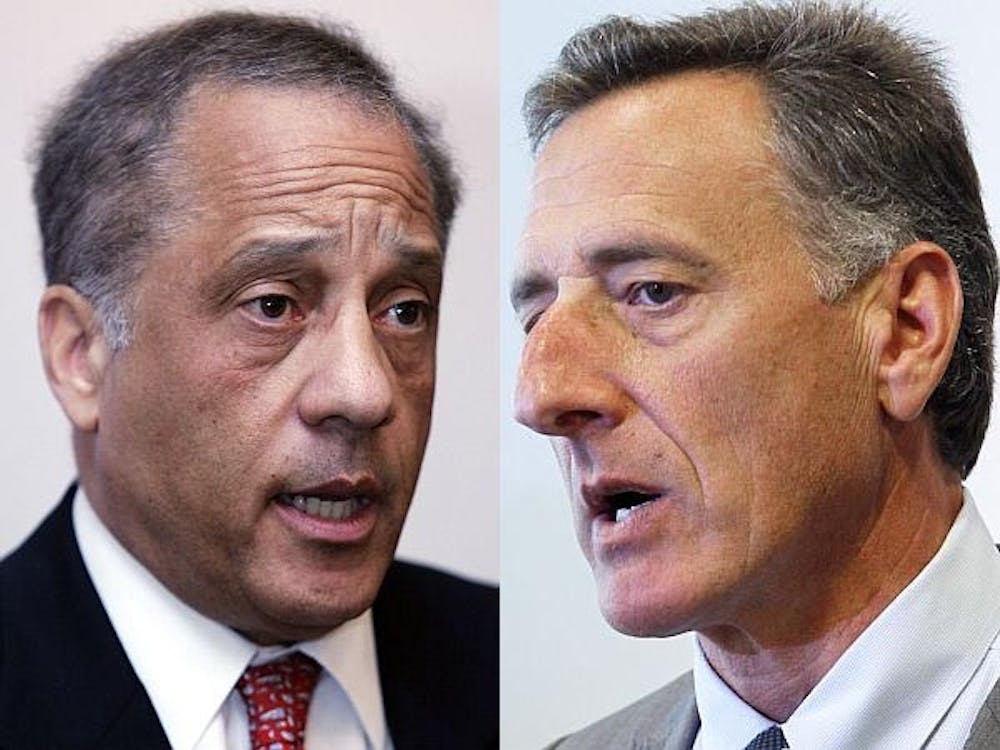On Thursday, Oct. 18, the Vermont gubernatorial race heated up during the WPTZ-televised crossfire between democratic incumbent Peter Shumlin and republican challenger Randy Brock, which marked the final debate of the series before the polls open on Nov. 6.
While the debate played out many of the trends seen in the presidential debates — candidates speaking over one another, pushing the clock and reframing many of the questions in the context of job creation — the framework of this final debate allowed Brock and Shumlin to directly question each other, and neither shied away from the opportunity.
Shumlin began the back and forth by questioning the feasibility of Brock’s “business in a box” plan that Brock has touted as part of his plan to stimulate Vermont’s economy, which is still reeling as a result of tropical storm Irene and the national economic downturn. Calling this plan the “cornerstone” of Brock’s economic policy, Shumlin quoted Brock in a recent interview with a Burlington TV (WCAX) reporter:
“Suppose you’re an unemployed Vermonter — what would you do? You’d buy a franchise,” Shumlin quoted. He then asked Brock how this would be possible given the limited resources of unemployed Vermonters.
“Governor, I’m not sure what you listened to,” replied Brock, “because you didn’t listen to what I said.”
Brock went on to insist that Shumlin had completely misunderstood his plan and that it was not the cornerstone but rather one small piece of a twenty-five piece economic plan; despite his rebuttal, the governor came out of the spar as skeptical as ever.
Having worked with Brock this summer, political science major and president of the College Republicans Sydney Fuqua ’13 had a lot to say about the financial policy differences between the two candidates.
“[Brock] is a strong fiscal conservative with strong ideas on how to deal with Vermont’s budget and healthcare challenges,” said Fuqua. “He is not about to propose a program without having all of the facts and funding ready and visible for Vermont voters.”
Shifting the focus entirely, Brock lit into Shumlin by calling attention to a recent land dealing that was made between Shumlin and one of his campaign contributors in which Shumlin profited significantly.
Shumlin responded by saying that he had purchased this piece of land with a longtime friend Tom Hagemann with whom he is “as close as any two people can be,” adding that this issue has been “extraordinarily misrepresented in the press.”
Brock nevertheless repeated his concern with the specifics of Shumlin’s financial gain.
“Most Vermonters don’t spend $35,000 and gain $113,000 over night,” said Brock. “All I can say is governor, you got a heck of a deal.”
“That’s because I’ve improved the property,” Shumlin shot back, referencing many instances of infrastructure upgrades to the land, all of which Brock contested as irrelevant to the profiting issue at hand. With a final touch of exasperation Brock told Shumlin: “If you can do that, you ought to be doing that for the state of Vermont.”
“I am every single day,” said Shumlin. “I am doing that for the taxpayers every single day that’s why we’re growing jobs and economic opportunities under my watch.”
After this, the conversation grew increasingly heated as both Shumlin and Brock began to speak over each other, seeming to vent their frustration on issues that had been addressed and misrepresented in prior debates.
Brock spent the rest of his questioning time asking Shumlin about what he saw to be shady campaign finance dealings made under the guise of policy making.
“Is it appropriate for you to visit [Hewlett-Packard] in California and come away with a campaign contribution?” asked Brock, referring to money that Shumlin’s campaign received from Hewlett-Packard after
Shumlin visited the company regarding its unsatisfactory work with the Vermont DMV.
“Unlike other governors,” responded Shumlin, “I flew to California, I met with HP [and] I didn’t ask for a contribution; I wouldn’t do that. I am an ethical person and I suspect that you know that.”
Brock later pointed out that Shumlin had received contributions from a marijuana reform group called the National Organization for the Reform of Marijuana Laws (NORML), affiliated with the Soros Foundation, and offered to promote their views in Vermont and in other states as well.
“It wasn’t linked to a contribution; it was a simple statement of fact that I’ve talked to the Soros foundation … about helping them to come up with smarter drug policies.”
Despite the back and forth on how exactly the contribution came about, what became abundantly clear was the gap between each candidate’s views on drug policy in Vermont. Brock accused Shumlin of supporting marijuana use in Vermont through his push to decriminalize it and to refocus police resources on other drug issues.
“What we do have the authority to do,” said Shumlin, “is to [pass] smart drug laws by decriminalizing small amounts of marijuana and to use our precious law enforcement dollars to help crack down on the huge drug challenges we’re facing in Vermont.”
“We’re not spending a lot of law enforcement resources on small amounts of marijuana,” retorted Brock. “In a state that has the most serious problem with teenage marijuana use in the nation, you’ve created a situation where you’re effectively supporting the expansion of marijuana.”
Shumlin brushed off the comment saying, “Let’s agree to disagree,” as time ran out.
In addition to addressing drug issues and Vermont economic hardships, candidates will also need to address Vermont’s new healthcare policies.
Criticizing Shumlin, Fuqua added, “Shumlin’s healthcare program won’t have a price tag for Vermonters to judge until 2013.”
The candidates will continue to the campaign for these last three weeks before the election. Castleton State College’s most recent poll in August had Shumlin up 34 points, a sizable lead that Brock plans to chip away at in the coming weeks.
Sparks Fly in Vermont’s Final Gubernatorial Debate

Comments



